|
 |
|
 |
 |
 |
 |
 |
 |
 |
 |
 |
 |
 |
 |
 |
 |
 |
 |
 |
 |
 |
 |
 |
 |
|
Daily
Web Coverage: Monday
Tuesday
Wednesday Thursday
Friday
|
|
|
|
 |
|
Eighteenth Meeting of the Animals Committee
|
|
|
|
|
|
San José, Costa Rica, 8-12 April 2002
|
|
|
|
|
|
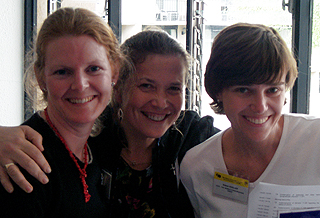 |
|
Wednesday, 10 April
Trade
in Tursiops Truncatus Ponticus:
This item was discussed on Tuesday afternoon, 9 April and Wednesday morning, 10 April. On Tuesday, the US presented results of the report (AC18/Doc. 16.1 and AC18/Inf. 2) on the biological and trade status of the Black Sea bottlenose dolphin (Tursiops truncatus ponticus). She noted the resolution of the Agreement on the Conservation of Cetaceans of the Black Sea, Mediterranean Sea and contiguous Atlantic Area (ACCOBAMS) banning importation of this species and, as in the Bern Convention, calling for the species' transfer to Appendix I. Oceania, with the UK, Switzerland and the IWMC, noted that the level of reported trade and population statistics do not indicate a large trade effect compared to other impacts. The US urged that further threats, including trade, be avoided. Israel opposed the imposition of a zero export quota, and with IFAW and Pro Wildlife, called for endorsing the ACCOBAMS recommendation. Israel and the US suggested that the Animals Committee make a clear recommendation to COP-12 on this issue. Germany pointed out that uplisting requires certain biological criteria, but does not require that trade be the most significant threat.
|
|
|
|
Sarah Fowler, IUCN SSC Shark Specialist Group (left), Amanda Vincent, Project Seahorse and Alison Rosser, IUCN SSC Wildlife Trade Programme
|
|
|
|
|
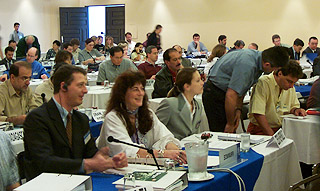 |
|
|
|
|
|
|
|
|
|
|
|
|
|
|
|
|
|
|
|
|
|
|
|
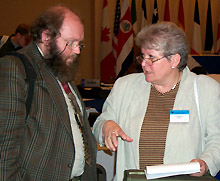 |
|
Spain stated that there is no biological basis for the proposed uplisting. Europe noted that the species is traded primarily for dolphin shows, and supported an Appendix I listing. North America proposed that the ACCOBAMS species status report be forwarded to COP-12. Chair Hoogmoed said that, based on data showing the dolphin population as stable or increasing and that trade is minor, no uplisting is needed. Oceania, supported by North America and Central/South America and the Caribbean, called for caution in stating the population is stable or increasing. Africa suggested asking the International Whaling Commission what is considered a reasonable offtake. The Secretariat noted an upcoming meeting with Black Sea range States on sturgeon, where this matter could also be discussed, to which Chair Hoogmoed agreed, deferring the issue to a subsequent Animals Committee meeting.
|
|
|
|
|
|
Peter Linhart, Austria, with Irina Sprotte, Germany
|
|
|
|
|
|
|
|
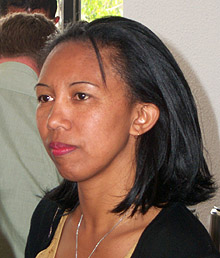 |
|
|
|
Captive
Breeding, Ranching and Wild Harvest Production Systems for
Appendix II Species:
The Secretariat noted that minimal progress had been made on this issue due to terminology and implementation problems related to possible changes in source codes. He added that it would be difficult for management authorities to support changes in production system definitions in the Convention. IUCN was contracted to prepare a report classifying production systems. The US, Germany, and others supported the Secretariat's comments, while Europe was pleased that source codes would not be changed. The David Shepherd Conservation Foundation and IWC expressed concern that ranching source codes were being abused to circumvent CITES quotas. The Chair said the issue would be further discussed at the next Animals Committee meeting
 Listen
to the RealAudio introduction
Listen
to the RealAudio introduction
|
|
|
|
|
|
|
Soarilanto Sahondra Rabeshihanaka, Madagascar
|
|
|
|
|
Trade
in Freshwater Turtles and Tortoises in Southeast Asia:
On Wednesday morning, Chair Hoogmoed introduced the report from a workshop on freshwater turtles and tortoises (AC18/Inf. 12), held in March 2002 in Kunming, China. The Secretariat identified the workshop's findings:
*all Asian range States have conservation problems due to trade;
*all participating countries are undertaking actions to address these conservation problems;
*there is more legislation than originally thought by the Secretariat, although compliance and enforcement are inadequate;
*commercial turtle and tortoise farming is more extensive than anticipated; and
*collaboration among range States is welcomed by all participants.
India highlighted substantial illegal trade in the Kachuga species, and requested a co-proponent for a proposal to COP-12 on its listing in Appendix II. The working group on freshwater turtles and tortoises met on Wednesday evening to discuss recommendations for COP-12
|
|
|
|
|
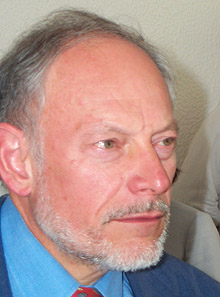 |
|
|
|
|
|
|
|
|
|
|
 |
|
|
|
Conservation
of Seahorses (Syngnathidae):
This item was discussed in Plenary on Wednesday morning. Highlighting aspects from the Syngnathidae report (AC18/Doc. 18.1), Project Seahorse cited key findings:
*there is considerable taxonomic confusion;
*Syngnathidae biology remains unknown, despite increasing research;
*heavy trade exists in certain genera;
*many countries are involved in trade, such as the EU, which imports from 24 countries;
*there are gaps and inconsistencies in trade data, and global volumes are higher than indicated by samples; and
*Australia has made the most extensive efforts to manage Syngnathidae
She announced that enough funds had been raised for a Syngnathidae workshop, which will be held from 27-29 May 2002 in Cebu, the Philippines, and will generate inputs to COP-12. Responding to a question from Israel, Project Seahorse said ghost pipefish (Solenostomidae) are outside the working group's mandate. The Animal Committee adopted the Syngnathidae report
 Listen
to Project Seahorse
Listen
to Project Seahorse
|
|
|
|
|
|
|
|
|
|
|
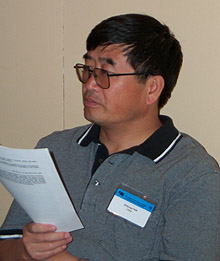 |
|
|
|
|
|
|
Biological
and Trade Status of Sharks:
On Wednesday morning, Chair Hoogmoed reported on contact with the UN Food and Agriculture Organization (FAO) (AC18/Inf. 7) on implementation of the International Plan of Action (IPOA) for sharks. Oceania appreciated the explanation of lack of progress on the IPOA, calling for CITES to be more proactive. On behalf of Australia (AC18/Inf. 1), Oceania stated that a national plan of action (NPOA) is being prepared, stressing protection of sharks through CITES and support for NPOAs. Japan supported collaboration with FAO, and, with IWMC-CH, expressed concern over consideration of non-CITES species. The Chair noted this issue will likely be on the COP-12 agenda and that two shark species are on CITES Appendix III.
The IUCN Shark Specialist Group: presented the report of implementation of IPOAs (AC18/Doc. 19.2 and AC18/Inf. 10); expressing concern at the lack of action, called for CITES to take a more active role; and with the IWC and the UK and opposed by Japan, urged consideration of the topic at COP-12. India commended the IUCN report, noting that illegal shark trade is occurring in his country. The UK noted an unsuccessful proposal at COP-11 to list basking shark (Cetorhinus maximus) on Appendix II, and said they will make the same proposal at COP-12. IFAW suggested forwarding WWF recommendations on the conservation and management of sharks (AC18/Inf. 15) to COP-12
 Listen
to the report from the Shark Specialist Group
Listen
to the report from the Shark Specialist Group
|
|
|
|
|
|
|
|
|
|
|
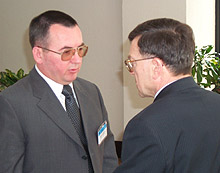 |
|
|
|
|
|
|
|
Members of the Russian Federation
|
|
|
|
|
Trade
in Alien Species:
Oceania, Chair of the working group on trade in alien species, introduced the report (AC18/Doc. 20.1). He noted that there was a lack of progress due to time and resources constraints, and that the group is still in the process of drafting a list of invasive species. He recommended continuing work with IUCN/SSC, ISSG and the Convention on Biological Diversity (CBD) on this issue. Chile said the Global Invasive Species Programme could help link CITES and the CBD. Israel noted that it has begun work on an extensive risk assessment of invasive species imports. The Animal Committee adopted the report
|
|
|
|
|
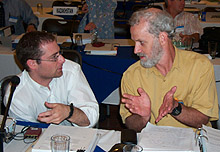 |
|
|
|
|
|
|
Conservation of Acipenseriformes:
The Secretariat introduced the document on Acipenseriformes (AC18/Doc. 21), which reports on the progress made to implement conservation measures by all parties involved in the sturgeon trade. He said this was a high priority issue and that it was the task of the Animal Committee to review the report and forward recommendations to COP-12. The Russian Federation highlighted the joint management of Caspian Sea sturgeon stocks. The US noted that the document shows commitment from parties on a controversial issue and was an example of how CITES parties can agree on a common goal. Iran underlined considerable progress on implementation, and the International Caviar Importers Association noted an improvement on illegal fishing in the past three years. IWMC-CH congratulated the range States for cooperation on this issue
|
|
|
|
Mark Schulman, ENB, in conversation with Rod Hay, Oceania
|
|
|
|
|
|
|
 |
|
|
|
|
|
|
WORKING GROUPS
Revision of Resolution 8.9 (Rev.)
The working group on revision of Resolution Conf. 8.9 (Rev.), chaired by Switzerland, met to consider: the process of selecting species to be reviewed; the process of consultation with range States concerning implementation of Article IV (Regulation of Trade in Specimens of Species in Appendix II); compilation of information and preliminary categorization; and subsequent review of information and confirming categorization by the Animals or Plants Committee. Participants agreed on: addition of headings; the unwieldy nature of WCMC information printouts; a 60-day period for range States to respond to the Secretariat's notification of species selection; the need for revision of the categories; and a 60-day period for range States to respond to the consultants' report
|
|
|
|
|
|
Angela Barden, TRAFFIC International
|
|
|
|
|
|
|
 |
|
|
|
|
|
|
Caviar Label Working Group:
The working group on the universal labeling system for the identification of caviar, chaired by Oceania, met to revise its draft document for COP-12. Delegates agreed on several definitions, inter alia, primary container, secondary container, re-packing plant and non-reusable label. There was also discussion regarding caviar tins, in which one delegate stressed the need to differentiate between first filling of a tin in the country of origin and re-packaging in the receiving country. Another delegate stressed the need to mention domestic trade. The working group agreed on the document's recommendations, particularly on the need to be flexible regarding different national laws
|
|
|
|
|
|
Richard Parsons, Safari Club International
|
|
|
|
|
|
|
|
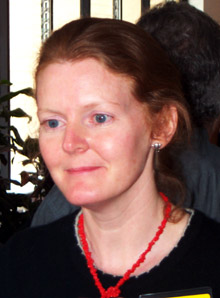 |
|
Acipenseriformes
The working group met on Wednesday night, 10 April to discuss the Secretariat's document on the conservation of Acipenseriformes.
|
|
|
|
|
|
The working group on the registration and monitoring of captive breeding operations discussed issues of captive breeding of Appendix I species (AC18/Inf. 11). The focus was on how to determine which Appendix I species are critically endangered in the wild "and/or" difficult to breed or keep in captivity. Issues raised included: whether to consider species at a global, national, or regional scale; whether to consider subspecies; the disconnect between countries' national legislation; and the rights of States to place species on Annex III, the list of species difficult to breed or keep in captivity. Delegates debated establishing new criteria or returning to past requirements that breeding facilities register through the Secretariat. Most delegates supported the definition of critically endangered as a species categorized as such by IUCN, or requested by a range State to be included in Annex 3
|
|
|
|
|
|
Sarah Fowler, IUCN SSC Shark Specialist Group
|
|
|
|
|
|
|
|
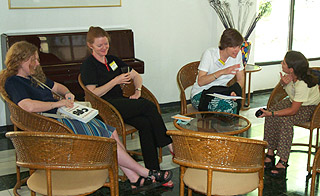 |
|
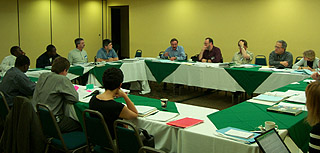 |
|
|
|
|
|
|
Revision of Resolution 8.9 on Significant Trade
|
|
|
|
|
|
|
|
Participants relax for a moment before the start of the Working Groups
|
|
|
|
|
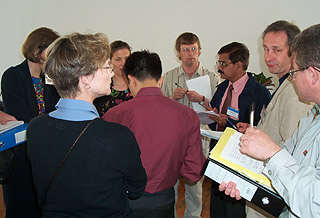 |
|
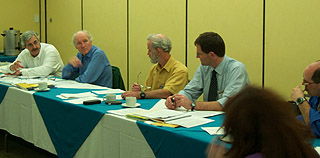 |
|
|
|
|
|
|
Caviar labeling Working Group
|
|
|
|
|
|
|
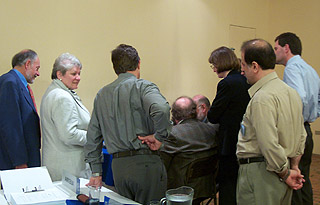 |
|
|
|
Captive Breeding Working Group
|
|
|
|
|
|
|
|
|
Participants share information prior to the start of the Plenary
|
|
|
|
|
|
|
|


















